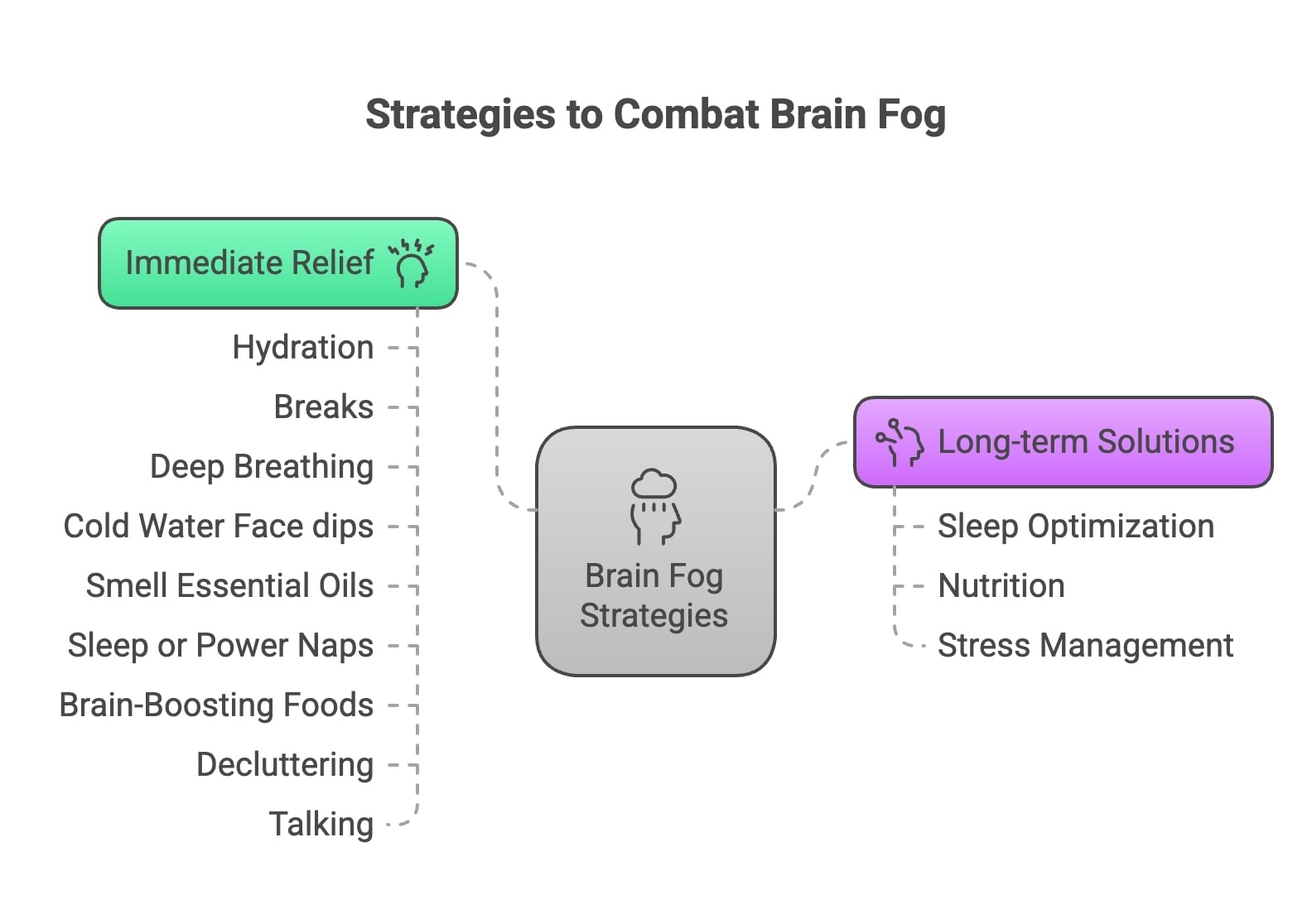
Amaha / / / How to Get Rid of Brain Fog: Complete Guide to Clear Brain Fog Signs and Symptoms
ARTICLE | 8 MINS READ
How to Get Rid of Brain Fog: Complete Guide to Clear Brain Fog Signs and Symptoms
Published on
12th Jun 2025

Dr Anuradha Kabra
MD Psychiatry

You know that feeling when you're sitting in an important meeting, and suddenly your mind feels like it's wrapped in a cloud? Or when you walk into a room and completely forget why you came there in the first place? It's that persistent mental cloudiness that makes even simple tasks feel impossible to complete. And honestly, it's becoming more common than we'd like to admit, especially in our fast-paced Indian lifestyle.
What Is Brain Fog Really?
Brain fog is essentially your brain's way of saying, "Hey, I need a break!" It's not a medical condition per se, but rather a symptom that something's off with your cognitive function. Your thoughts move slower. You forget names of people you've known for years. Simple math becomes rocket science.
Dr. Shivam mentions “Brain fog affects your executive functions – basically, all the mental skills you need to get things done. It's like having a smartphone with too many apps running in the background; everything slows down. You are overloaded from a dysregulated nervous system and basic tasks appear to feel complicated.”
People diagnosed with ADHD often experience ‘brain fog’. It can quite literally feel like a barrier or fog is coming between you and your thoughts.
Brain Fog Statistics in India: The Growing Reality
Recent data reveals alarming trends in cognitive health across India. 1 in 7 people have suffered from Brain Fog during their lifetime, mentions Sciencedirect.com. Urban areas show higher prevalence (13.5%) compared to rural areas (6.9%), indicating lifestyle factors play a crucial role.
Post-COVID statistics are particularly concerning. Research shows 58% of people with long-COVID symptoms lasting seven months experience brain fog, while 40% of students retrospectively reported cognitive impairment due to COVID-19. The workplace impact is significant, with 33% of employees noticing productivity decline due to mental health issues.[1][2]

Brain Fog and ADHD are usually linked. Check your Symptoms.
Take the Amaha self-assessment to know if you have ADHD
Brain Fog Signs and Symptoms: Spotting the Obvious and Hidden
The Obvious Signs Everyone Talks About
- Memory problems hit you first. you walk to the fridge and forget why, or blank out on a colleague’s name mid-chat.
- Concentration issues follow closely. You reread the same line, but nothing sticks—You keep re-reading the same page and still don’t grasp things. Even your favourite books.
- Struggling to focus—even on things you usually enjoy
- Mental fatigue creeps in next. Your brain feels exhausted even after a full night's sleep. Coffee doesn't help anymore; it just makes you jittery and unfocused.
- Trouble multitasking or following directions
- Slowed thinking - Like your brain is wading through molasses
- Disorganisation - Tasks pile up, and you feel scattered
- Constant Fatigue - You feel tired no matter how much you rest.
Brain Fog Hidden Signs Most People Miss
Here's where it gets interesting – brain fog has sneaky symptoms that often go unnoticed.
- Emotional numbness is a big one. You might feel disconnected from your usual emotional responses. That Bollywood movie that usually makes you cry? Nothing. Your favorite team winning? Meh.
- Decision paralysis becomes your new normal. Choosing between two restaurants for dinner feels overwhelming. Even picking what to wear in the morning takes forever.
- Word-finding difficulties sneak up on you. You know what you want to say, but the words just... aren't there. It's like having the word on the tip of your tongue permanently.
- Social withdrawal happens gradually. Small talk feels exhausting, so you start avoiding social gatherings. Video calls become draining rather than energizing.
- Physical clumsiness increases. You bump into things more often, drop your phone, or miss your mouth while drinking chai – yes, that actually happens with brain fog.
How Does Brain Fog Feel Like?
Everything feels muffled. Conversations sound like they're happening underwater. Your thoughts move like they're swimming through honey instead of flowing freely. You feel present but not really there – like watching your life through a foggy window.
One patient described it perfectly: "It's like my brain is a computer with too many tabs open, and now everything's running super slow."
Brain Fog Causes & Reasons: Why Does My Brain Feel Foggy?
Lifestyle Factors That Fog Up Your Mind
- Sleep deprivation tops the list. Your brain needs 7-8 hours to clear out metabolic waste – think of it as your nightly mental housekeeping.
- Chronic stress When you're constantly in fight-or-flight mode (thanks to traffic jams, work deadlines, and family pressures), your brain prioritises survival over clear thinking.
- Poor nutrition Skipping breakfast, loading up on processed foods, and those endless cups of cutting chai create blood sugar roller coasters that leave your brain gasping for consistent fuel.
- Dehydration Even mild dehydration can reduce cognitive performance by up to 15%. In India's heat, this becomes a major factor.
Medical Conditions Behind the Fog
- Hormonal imbalances, especially thyroid disorders, are common culprits in Indian women. PCOD, menopause, and even PMS can create hormonal storms that cloud mental clarity.
- Autoimmune conditions like rheumatoid arthritis or lupus often come with brain fog as an unwelcome companion.
- Mental health issues including depression and anxiety don't just affect your mood – they literally change how your brain processes information causing mood disorders.
- Medication side effects from common drugs like antihistamines, blood pressure medications, or even some supplements can contribute to mental haze.
- COVID or Illness after-effects: Post-medical illness fatigue is real.
How to Get Rid of Brain Fog: Practical Steps That Actually Work
Ready for some good news? Brain fog isn't permanent, and you don't need expensive treatments to clear it up.
Immediate Relief Strategies
- Hydration works faster than you'd expect. Drink two glasses of water right now – not kidding. Dehydration-related brain fog can improve within 15-20 minutes of proper hydration.
- Take Breaks: Step away from your screen every hour. Take a 10-minute walk outside. Fresh air and movement increase blood flow to your brain.
- Practice deep breathing. Five minutes of deep, intentional breathing can reset your nervous system and clear mental cobwebs.
- Cold water on your face provides immediate alertness. It activates your parasympathetic nervous system, essentially hitting your brain's refresh button.
- Essential oils like peppermint or eucalyptus can provide quick mental clarity. Keep a small bottle in your desk drawer for emergency fog lifting.
- Sleep for 7-8 Hours or Power naps of 10-20 minutes can reset your cognitive function. Any longer, and you'll wake up groggier than before.
- Eat Brain-Boosting Foods: Think walnuts, spinach, eggs, and fish. Don’t skip breakfast!
- Declutter Your Space: A tidy desk can mean a clearer mind
- Talk About It: Sometimes, sharing with friends or family helps you feel less alone
How To Cure Brain Fog: Long-term Solutions
Sleep Optimisation
Create a sleep schedule that your body can depend on. Indians often underestimate the power of consistent sleep timing. Your brain craves routine more than variety when it comes to rest.
Keep your bedroom cool and dark. Yes, even in Indian summers, invest in good curtains and fans. Your brain produces melatonin better in cooler, darker environments.
Limit screens for at least an hour before bed. The blue light from phones and laptops tricks your brain into thinking it's daytime.
Nutrition for Mental Clarity
Eat brain-boosting foods regularly. Walnuts, fish, leafy greens, and berries aren't just healthy – they're brain fog fighters. Include them in your daily diet, not just occasionally.
Maintain stable blood sugar. Eat smaller, frequent meals rather than three large ones. This keeps your brain's fuel supply steady.
Consider supplements wisely. Omega-3 fatty acids, Vitamin D, and B-complex vitamins can help, but consult a doctor first. Self-medication often backfires.
Stress Management Techniques
Meditation doesn't have to be complicated. Even five minutes of mindful breathing can reduce stress hormones that contribute to brain fog.
Physical exercise is non-negotiable. A 30-minute walk, yoga session, or even dancing to your favorite songs can clear mental haze effectively.
Set boundaries with work and social commitments. Saying no to some things means saying yes to mental clarity.

How to Test Brain Fog
Unlike other health issues, brain fog doesn't have a specific medical test. However, you can assess your mental clarity through simple self-evaluations:
- Track your symptoms for a week. Note when fog appears, what triggers it, and what helps. Patterns often emerge that point to specific causes.
- Use self-assessments available online. Simple memory games, attention tasks, and processing speed tests can help you monitor improvements. Check yourself for ADHD.
- Keep a mood and energy journal. Often, brain fog correlates with emotional states and energy levels.
- Consult healthcare professionals if symptoms persist. Blood tests can reveal nutritional deficiencies, hormonal imbalances, or other underlying conditions. Get checked for your mental health as well from a psychiatrist.
Lifestyle Strategies to Cope with Brain Fog
Living with occasional brain fog doesn't mean accepting defeat. Smart lifestyle adjustments can minimize its impact:
1. Create external memory systems. Use phone reminders, sticky notes, and calendars liberally. Your future self will thank you.
2. Simplify decision-making. Prepare clothes the night before, meal prep on weekends, and create routines that reduce daily decisions.
3. Communicate openly with family and colleagues about your challenges. Most people are understanding when they know what's happening.
4. Schedule demanding tasks for your clearest times of day. If you're sharpest in the morning, tackle important work then.
5. Build buffer time into your schedule. Brain fog makes everything take longer, so plan accordingly.
Brain Fog Treatment: When to Seek Professional Help
While lifestyle changes help most people, sometimes professional intervention is necessary. Consider seeing a doctor if:
- Brain fog persists for more than a few weeks despite lifestyle changes
- It's significantly impacting your work or relationships
- You're experiencing other concerning symptoms
- Simple daily tasks become overwhelming
Healthcare providers can identify underlying conditions, adjust medications that might be contributing, or recommend specialised treatments.
Moving Forward: Your Journey to Mental Clarity
Brain fog might feel overwhelming, but it's not a life sentence. Most people see significant improvement within 2-4 weeks of implementing consistent lifestyle changes.
Start small. Pick one or two strategies from this guide and implement them consistently before adding more. Your brain responds better to gradual changes than dramatic overhauls. Track your improvements. Small wins add up to significant changes over time. Celebrate the moments when your mind feels sharp and clear. Amaha has specialised protocols to help you deal with brain fog and any underlying mental health condition.

Still Require Expert Help with your condition?
Take a Free Coach call to better understand what you are going through
Frequently Asked Questions
1. How long does brain fog last?
Brain fog duration varies depending on the underlying cause. Temporary brain fog from dehydration or lack of sleep can clear within hours, while fog related to chronic conditions may last weeks or months. Most people see improvement within 2-4 weeks of addressing lifestyle factors like sleep, nutrition, and stress management.
2. Can brain fog be a sign of something serious?
While brain fog is usually related to lifestyle factors, it can sometimes indicate underlying health conditions like thyroid disorders, autoimmune diseases, or mental health issues. If brain fog persists for more than a few weeks, significantly impacts daily life, or occurs with other concerning symptoms, consult a healthcare professional for proper evaluation.
3. What foods help clear brain fog instantly?
Foods that stabilize blood sugar and provide sustained energy help clear brain fog quickly. These include nuts (especially walnuts), eggs, yogurt, berries, leafy greens, and fatty fish. Avoid processed foods, excessive sugar, and caffeine crashes that can worsen mental cloudiness.
4. Is brain fog related to age?
Brain fog can affect people of all ages, but it's not a normal part of aging. While older adults may experience some cognitive changes, persistent brain fog often indicates treatable underlying causes like hormonal changes, medication effects, or lifestyle factors rather than inevitable age-related decline.
5. Can exercise immediately help with brain fog?
Yes, light to moderate exercise can provide immediate relief from brain fog. A 10-20 minute walk, stretching, or yoga increases blood flow to the brain and releases endorphins that improve mental clarity. However, avoid intense exercise when experiencing severe brain fog, as it may worsen symptoms if you're already physically or mentally exhausted.
6. Does Water Reduce Brain Fog? Is Hydration Important?
Absolutely yes, and the connection is stronger than most people realize. Your brain is about 73% water, so even mild dehydration affects its performance dramatically.
In India's climate, we lose water constantly through sweating. Brain fog is one of the first signs of dehydration, appearing even before you feel physically thirsty. Aim for at least 8-10 glasses of water daily, more if you're in air conditioning or spending time outdoors. Add a pinch of salt or lemon to enhance absorption – your grandmother's nimbu paani wisdom was scientifically sound.
Was this article helpful?
Yes
No
If you didn't find what you were looking for, please reach out to us at [email protected] or +912071171501. We're here for you - for anything you might need.



Build a good life for yourself
with Amaha
Best App
for Good
on Google Play India

